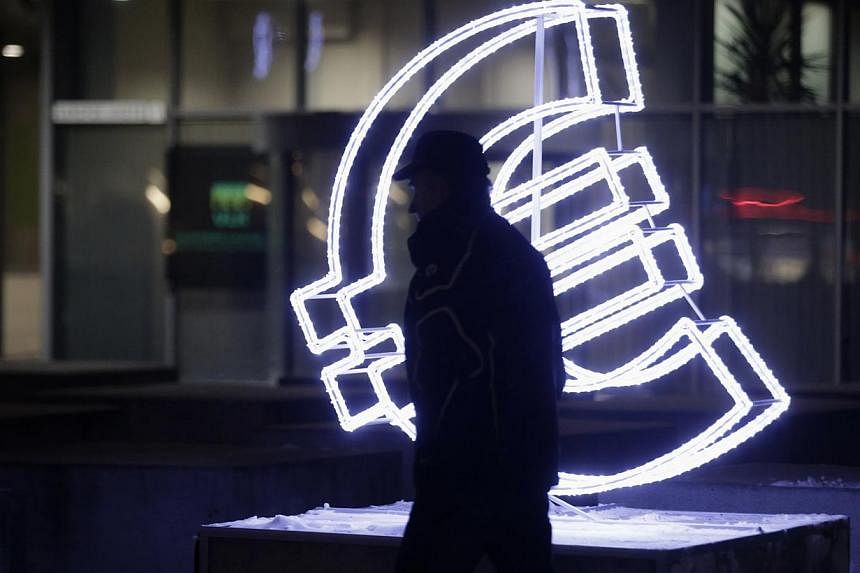SINGAPORE - The euro plunged to a nine-year-low on Monday, hit by political instability in Greece, darker deflationary fears for the eurozone and the continued fall in oil prices.
As Greece nears its Jan 25 snap elections, investors fear a Greek exit from the euro bloc of member nations may not be avoided, should the leading leftist anti-bailout political party win. Meanwhile in Germany, monthly inflation numbers came in on Monday at their lowest level since October 2009, stoking fears of deflation in the region, struggling to recover from its debt crisis.
In response, the euro plunged to US$1.1933 overnight - its its lowest level since March 2006 - before recovering slightly to trade around $1.1946 in Asia on Tuesday.
A year ago, one euro could buy 1.73 Singapore dollars. That fell to S$1.69 six months ago to S$1.60 last week. Around 4pm on Tuesday, the euro was trading at S$1.59.
Now, the European Union (EU) is Singapore's third largest trading partner, accounting for close to 10 per cent of Singapore's global trade in 2013. In 2013, Singapore exported €17.8 billion (S$28.4 billion) worth of goods to the EU, while its imports from the region totalled €28.7 billion, according to data from the European Commission.
The EU was also the largest contributor of foreign direct investment (FDI) into Singapore in 2012, accounting for almost S$190 billion and 26 per cent of the Republic's total FDI in 2012, according to the Ministry of Trade and Industry. More than 10,000 EU businesses, from manufacturers to financial houses, have offices in Singapore.
A falling euro is obviously good news for Singaporeans planning to visit Europe this year but economists say the impact on Singapore's economy is more mixed:
Here are three things they have to say:
1. Limited impact on Singapore's export competitiveness
A weaker euro could hurt Singapore's export competitiveness, but CIMB economist Song Seng Wun expects that the euro downswing will have a minimal impact on importers and exporters, as the trend of a weak euro "has been clear for some time now, and most businesses would have hedged their positions".
Moreover, it is typical for most firms to have their goods priced in US dollars rather than euros, Mr Song said.
2. Singapore will benefit in the longer-term from the spillover effects of a weaker euro helping eurozone economies
Bank of America Merrill Lynch economist Chua Hak Bin believes that the weaker euro will benefit Singapore in the long run as it first helps European economies to recover.
"A lot of people have been suggesting that the euro should be weaker to help revive the eurozone economy, so this readjustment to a stronger US dollar is consistent with their divergent growth paths," he said.
Dr Chua also observed that the European Central Bank is now more prepared to embark on quantitative easing in the form of massive bond buying to lower borrowing costs, which would support the eurozone's growth, and with it its trading partners.
3. But plunging euro signals fear and uncertainty for the global economy
China's economy, the world's second-largest, is slowing. As for the eurozone, its sinking single currency is creating uneasiness about whether the region is on the verge of a new economic and financial crisis.
As Mr Song points out, the euro did not fall in a vacuum and signals broader shifts in the world economy.
In Singapore, two key interest rate benchmarks - the Singapore Interbank Offered Rate (Sibor) and the Swap Offer Rate (SOR) - have spiked in recent months on expectations of a United States interest rate hike and a stronger greenback.
Said Mr Song: "All this links to a single thing - fear for the global economy outside of the US, and a preference for US dollar assets. The moving around of assets will create a lot more volatility."
Like with crashing oil prices, the growing worry is that the euro slide signals lower demand and portends a global economic slowdown.


